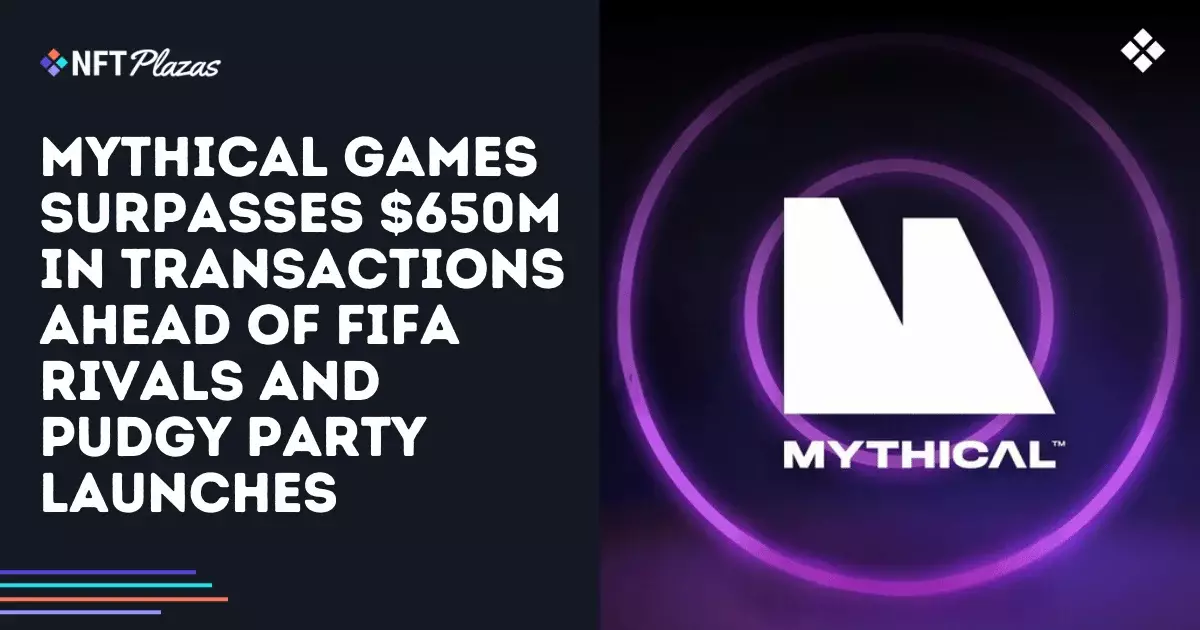In the rapidly evolving landscape of gaming, Mythical Games has made a significant mark, surpassing $650 million in total transaction volume across its platform. This feat is not merely a number; it reflects the growing interest in blockchain technology fused with gaming, paving the way for a new kind of player interaction and asset ownership. With over 7 million registered players, Mythical’s approach reverberates through the industry, highlighting a shift in consumer expectations. The company’s recent announcements and upcoming titles, including FIFA Rivals and Pudgy Party, position it as a frontrunner in the NFT gaming space, and one can’t help but feel eyes narrowing with both envy and admiration from competing developers.
Upcoming Mobile Giants: FIFA Rivals and Pudgy Party
Scheduled for global launch in 2025, FIFA Rivals, developed in partnership with FIFA, stands to be a cornerstone of Mythical’s strategy. By focusing on mobile platforms, the company is not only reaching gamers where they are but also tapping into a lucrative market with significant growth potential. The game promises short, arcade-style football matches along with digital trading cards, inviting casual gamers who may be hesitant to immerse themselves in more complex gaming ecosystems. On the other hand, Pudgy Party, derived from the beloved Pudgy Penguins brand, aims to attract a different segment—casual gamers looking for delightful user experiences rather than competitive landscapes.
The bold targeting of both niche and mainstream markets through these titles is commendable. Still, one cannot overlook the fact that while these games seem promising on paper, the real challenge lies in execution. Delivering a seamless user experience while embedding blockchain functionality without overwhelming the player is a tall order. This ambition can either catapult Mythical Games to unprecedented heights or subject them to unavoidable scrutiny if they fail to meet heightened expectations.
Building the Ecosystem: Mythical Platform and Beyond
At the heart of Mythical Games’ strategy lies the Mythical Platform, an innovative backend system designed specifically for developers wanting to weave blockchain features into their games. The allure of asset ownership and trading can be enticing, especially for players invested in digital economies. The integration of the $MYTH token for in-game purchases is a strategic move, making it central to the platform’s economic model.
However, one must critically consider the sustainability of this model in the long term. Players have grown weary of overly complex crypto transactions that detract from gameplay rather than enhancing it. Mythical Games’ approach of embedding blockchain functionalities within user-friendly interfaces is an attempt to balance these tensions. Yet, this raises further questions about whether they are merely glossing over potential frustrations that could arise from the complexities involved in cryptocurrency.
The Investment Landscape: A Show of Confidence
Backed by prominent investors such as Andreessen Horowitz and Animoca Brands, Mythical Games has a formidable support base. This backing affirms the belief in their understanding of the gaming market and blockchain technologies. However, one must also remain vigilant; lofty investments can create undue pressure to perform and meet aggressive growth targets, often at the cost of innovation and quality.
As the company prepares for wider rollouts and possible partnerships, it is essential to remember that the gaming industry thrives on creativity and engagement. Failing to sustain this could condemn Mythical Games to a vicious cycle of chasing financial metrics at the expense of player satisfaction and loyalty.
The Road Ahead: Innovation Meets Tradition
Mythical Games is not merely a player in the NFT space; it seeks to redefine what gaming can be in an era where blockchain intersects with mainstream culture. While the company’s vision is commendable, striking a balance between innovation and ensuring a fulfilling player experience remains critical. As they advance toward their 2025 launches, avid gamers and industry watchers alike will be keenly observing—not just to celebrate their successes but also to learn from their challenges.
If executed effectively, Mythical Games could indeed lead a seismic shift in how we perceive and interact within the gaming sphere, ensuring that the future of gaming is not just lucrative but also enriching and accessible to all.















